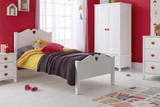The first major milestones: Walking & Talking
Nothing is more exciting than watching your baby reach a major milestone. In this blog post, we’ll take a look at some of the first milestones that babies achieve and what you can do to encourage their development. Keep reading to learn more!
What are milestones for a baby and how are they important?
Each baby develops differently, but there are certain milestones that you should expect to see. A GP or pediatrician can help determine if your baby is on track for the milestones that they should be reaching.
Some of the milestones that you should expect to see include:
Walking. Around 9 months old, most babies start walking.
Talking. Most babies begin talking between 12 and 18 months old.
Saying their first words. Most babies begin saying their first words around 2-years-old.
It is important to note that most babies will not meet all of these milestones exactly on time. They are all different. However, it’s important that you let your doctor know when your baby is meeting any. Your doctor might need to be contacted by a developmental specialist if your baby is not meeting certain milestones on time.

How to track a baby’s milestones.
Starting at a very young age, a baby begins to grow and mature. As a baby grows, parents are encouraged to track their child’s development. This is part of the fun of being a parent; watching your child’s skills and talents develop.
Baby development milestones are one way parents can observe how their baby is growing and changing.
When a baby reaches a milestone – encourage and praise.
When your baby reaches each milestone, it is important to encourage and praise them. This will make them more confident and proud of their accomplishments.
The first time your baby stands up: The first time your baby stands up on their own, praise them, give them a hug, and encourage them to try again. Every time they stand up, praise them even more. Within a week, your baby will be walking and talking.
The first time your baby walks: The first time your baby walks, praise them and give them a reward for their hard work. Spend time with them, playing outside or taking them to the park to encourage this new found skill.
The first time your baby says their first word: When your baby says one of their first words, praise them and encourage you child to continue using more words. You can also teach your baby new words by singing to them and saying words to them slowly.
The first time your baby eats solid food: The first time your baby eats solid food, give them praise as they get used to the new food. Reward your child with their favourite food when they eat.
The first time your baby runs: When your baby runs, praise them and encourage them. You can also encourage your child to run by chasing them around the house.
The first time your baby jumps: When your baby jumps, praise them and encourage them. You can also encourage your child to jump by jumping with them.
The first time your baby crawls: When your baby crawls, praise them and encourage them. You can also encourage your child to crawl by crawling with them.
The first time your baby stands without holding onto something: When your baby stands without holding onto something, praise them and encourage them. You can also encourage your child to stand by standing with them.
The first time your baby climbs: When your baby climbs, praise them and encourage them. You can also encourage your child to climb by climbing with them.
How much a baby should walk and talk.
The most important development in your child’s development is the time that you spent with him/her. Talk to your baby as much as you can, even when the baby cannot talk back.
When should you worry?
Whatever your child’s age, if you are worried, talk to your baby’s doctor. They should always be your first port of call for any advice regarding your little one.
Recent Posts
-
Our Top 5 White Single Beds for Kids
One of the most popular types of childrens single bed is a classic white single bed. Offerin
-
Why Magical Mid Sleeper Beds are a Kid's Dream
When it comes to creating a bedroom for your child, you want it to be a place that inspires their im







